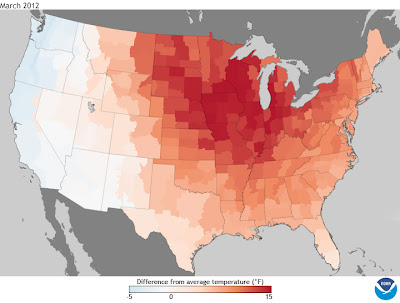Into every life a little rain must fall. Or a little drought. Or a little cold snap. Or a little record heat.
But recent years have been different around here, as they
have been all over the world. There was
nothing to compare (so far) to last month, when 15,272 warm temperature
records were broken in the U.S. alone.
Many of these affected us here at Good Hand Farm. Our normal problem in spring is dealing with
all the rain and mud, but not this year.
We’ve been running our irrigation pumps nonstop to deal with the
hottest, driest spring (and winter) we’ve ever seen.
And just when you think steady warmth is here for good –
Bam! Freezing cold spells.
 |
| Frost-blighted asparagus at Good Hand |
Despite this, today I ventured up to the asparagus field
with high hopes. Chef Tony from Salt
Gastropub – a great neighborhood restaurant – wanted another 10 lbs., and I was
sure we would have it for him. But when
I got there, my hopes were dashed: Bare
fields, punctuated by the occasional frost-blighted asparagus shoot. Worthless.
I called Tony back, feeling the need to apologize. All I had was a couple handfuls of shoots
suitable only for the chickens.
Just bad luck, perhaps?
Not at all. We’ve suffered major
losses in recent years from unprecedented extreme weather. Last year, my investment group suffered badly
when our hotel – located in the Northeast – suffered its second consecutive
year of 100-year floods, damaging property and driving guests away for
weeks.
 |
| Nice hotel, if you can get there |
We’ve watched with mixed feeling as Texas – home to an
entire Congressional delegation of climate deniers – has sweltered and burned
under the new
normal for the U.S. Southwest.
By September, 213 Texas counties (almost all of them) were USDA
disasters; forty-one straight days saw 100-plus heat; and agricultural losses came
to $5.2 billion at my last count. Texas wildfires last year alone burned an
area the size of Connecticut. This didn’t
persuade a single Texas lawmaker to seriously deal with climate change, as all of them are awash in oil money (check here to
find yours).
But ordinary people are beginning – I think – to connect the
dots. No amount of oil and coal advertising can blind an entire country to what’s
happening outside. They’re watching ExxonMobil, “Clean” Coal or Vote4Energy tell them
that all we need to do is find more fossil fuels and burn them into God’s
precious atmosphere, but they’re noticing the extreme heat, floods, droughts
and unpredictable weather. They’re realizing it’s not just “warming,” but “weirding.” It’s broiling when it should be cool; rains
fail entirely, until they come with a vengeance and destroy crops, fields, and property.
Gardeners know that plant
hardiness zones move pole-ward twenty miles per year. But that doesn’t stop freak cold snaps from
destroying early seedlings – or Chef Tony’s asparagus delivery.
 |
| Look hard: Can you find any asparagus in our normally-productive field? |
So give us a couple of days, and we’ll do our best to
fulfill our commitments to our produce customers. But in this age of “global wierding,” it’s
harder all the time.
Thanks for reading, and may God bless you.
J. Elwood
Check out this great video explaining why the weather is
both hotter and colder, dryer and more prone to flooding – generally more extreme – over so much of God’s
good earth.




